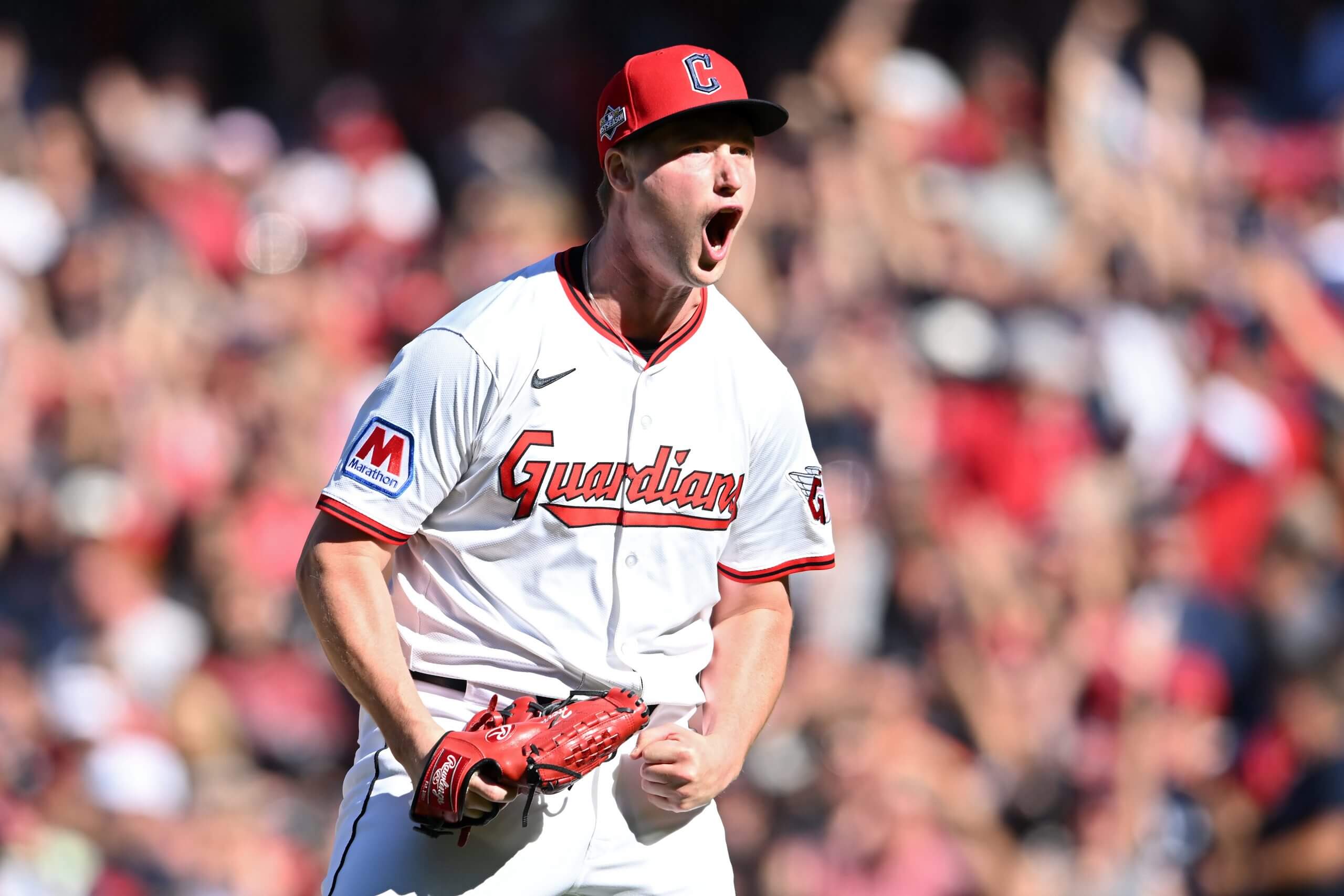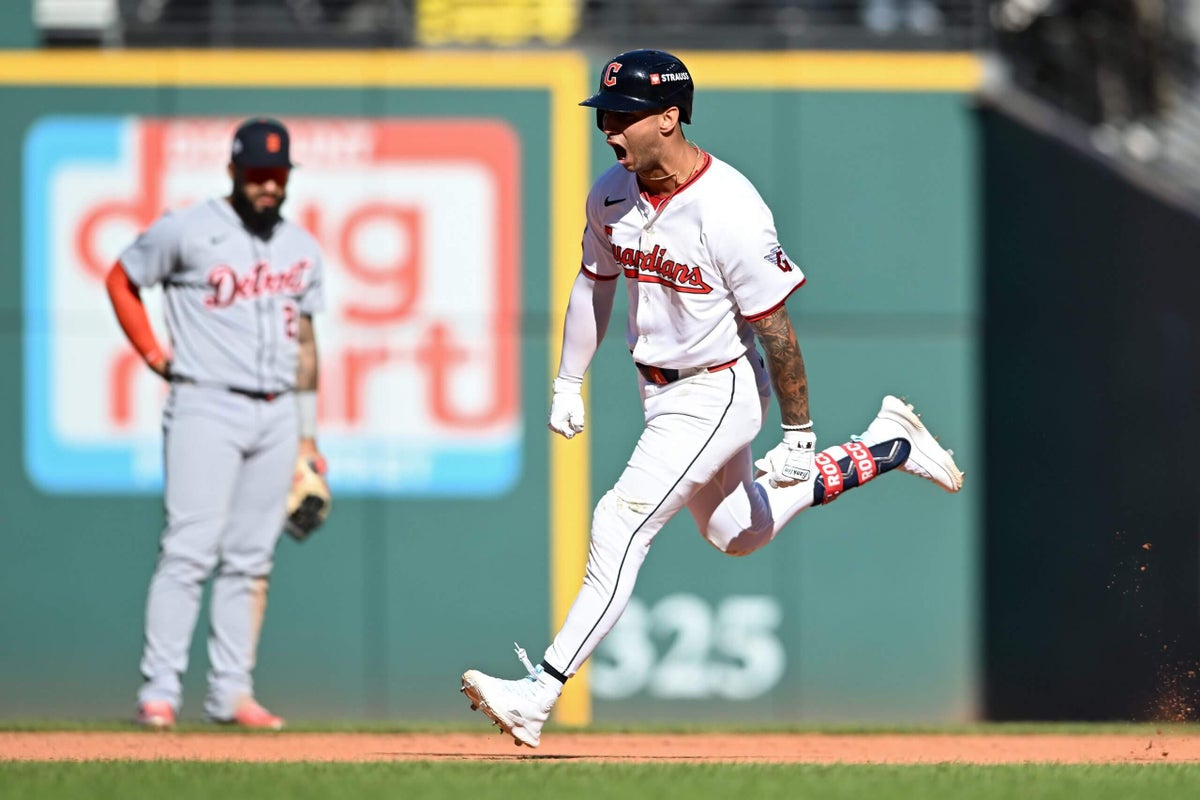CLEVELAND — Austin Hedges gets sick to his stomach before postseason games. In the dugout, he channels his nervous energy through endless conversation.
David Fry remembers pacing in the batting cage during the 2024 playoffs, his way of coping with wielding no influence over what was unfolding on the field. It’s why he typically parks himself next to Hedges in the dugout, so the two can maintain a frenetic dialogue that distracts them from their stress.
“There’s never silence,” Fry said Wednesday, after the Guardians staved off elimination with an eighth-inning offensive barrage and a collective exhale in the home dugout.
“That’s real,” catcher Bo Naylor said, laughing, after briefly listening to his two teammates discuss the suffocating pressure October can present.
Fry had coaches in the past who insisted he try to calm down so he could deliver in key moments of a game. He’d counter that he worked his entire life to have the chance to produce in an important spot. Why would he calm down? Why not embrace the reality of the situation?
“It’s the most stressed you could ever be,” Hedges said, “but that’s what you want. If it goes well, that’s the ultimate glory.”
The tension of postseason baseball can consume a player. Or, it can fuel a player. Every October, unlikely heroes emerge. They tack on new chapters to small-sample storybooks.
When the wind starts whipping in downtown Cleveland and the temperature carries that autumn bite and the pressure mounts and the team is desperate for any crumb of offense, the Guardians turn to their 5-foot-9 second baseman Brayan Rocchio, the one with a career big-league slash line of .222/.293/.327.
It’s like a mythical creature emerges from the depths of Lake Erie. He’s known around these parts as “Playoff Rocchio,” and all the unease of October — “Rocctober,” as Clevelanders have tossed around for a year now — somehow has no effect on him.
“I don’t know how he does it,” Hedges said, “but somehow, he’s like, ‘All right. I’m the best in the world now.’”
Rocchio initially thought the key to turning away the Tigers on Wednesday was to keep the ball on the ground to circumvent the stiff gusts blowing in from center. When he approached the batter’s box in the eighth, he had to deal with the wind, plus shadows that made it difficult to decipher the spin of the ball. As manager Stephen Vogt detailed, the shadows make every pitch resemble a fastball as it zips toward the plate.
José Ramírez, however, had a message for Rocchio. Two weeks ago, Ramírez clobbered a cutter from Troy Melton for a go-ahead home run to complete a sweep in Detroit. Ramírez urged Rocchio to seek out the hard stuff and to treat the cutter like a fastball, not a slider, which is what the pitcher prefers.
As Rocchio approached the plate, Ramírez made a prediction to anyone within earshot in the dugout.
He called the home run.
Why the hunch? After the game, Ramírez pointed to the side of his head and said he has a God-given knack for seeing the future. Maybe he just knew Rocchio would heed his advice.
“Everything he tells you,” Rocchio said, “that’s something you have to do.”
Rocchio’s postseason track record is making these moments seem routine. He posted a .333 average and .906 OPS in 10 playoff games in 2024, one of the few reliable sources of offense for a Cleveland lineup that bowed out in the ALCS.
That shifted the thinking on a once-prized prospect who had suffered through an uninspiring rookie campaign. Surely, the organization thought, the playoff prowess could serve as a springboard for his career.
Instead, he wound up in Triple A in early May. His slugging percentage was sitting below .200, and he admitted he was trying to repair the hideous numbers that flashed in 144-point font on the scoreboard every time he traipsed to the plate. In those moments, he felt anxiety.
In these moments? He feels nothing. October is when he thrives, and the calendar flipped to his favorite month on Wednesday, just in time.
“I don’t think about it,” he said. … “This is competing time. There’s no self-awareness.”
To some, the pressure is palpable. To others, it’s invisible.
Tim Herrin, who suffered through a rocky regular season that included a couple of trips to Columbus, simply morphs into his (teammate-coined) alter ego, Jim Herrin. The baby-faced, soft-spoken, gentle giant transforms into a 6-foot-8, curveball-slinging, fastball-firing behemoth on the mound, who pumps his fists and unleashes primal shouts as he struts back to the dugout. He recorded a pair of pivotal strikeouts to preserve a tie and buy the Guardians’ offense time to strike.
Herrin has been searching for Jim all season. He found him at the most critical juncture.

Tim Herrin, in full Jim Herrin mode. (Nick Cammett / Getty Images)
Rocchio did the same. He launched a 99.9-mph heater from Melton into a swirling jet stream. Rocchio’s exit velocity was only 96.8 mph, but that doesn’t account for the pixie dust Rocchio places on the sweet spot of his bat this time of year. Three days earlier, Rocchio had ended Cleveland’s regular season with a three-run blast off the right-field foul pole, a walk-off homer that propelled the club into postseason mode.
“He lives for the moment,” Herrin said.
“He’s got that dawg in him,” said Daniel Schneemann. “I don’t know. He’s a stud.”
In the clubhouse after both home runs, with the bass from a blaring hip-hop track shaking the room, Hedges, embodying his side gig as a ring announcer, awarded the team’s championship belt to “Playoff Rocchio.” It’s no longer just a local meme or a short-lived narrative. It has taken on life in the Guardians’ clubhouse. Rocchio enjoys the bit, even if, as he admitted, the transformation “is hard to explain.”
Maybe it’s supposed to be inexplicable. Maybe that’s the allure of October, when the pressure can be both daunting and comforting.
“Guys are either the same, or they’re worse,” Hedges said, “or, somehow, it makes them just capable of anything.
“At some point, coincidences stop being coincidences.”
(Top photo: Nick Cammett / Getty Images)

